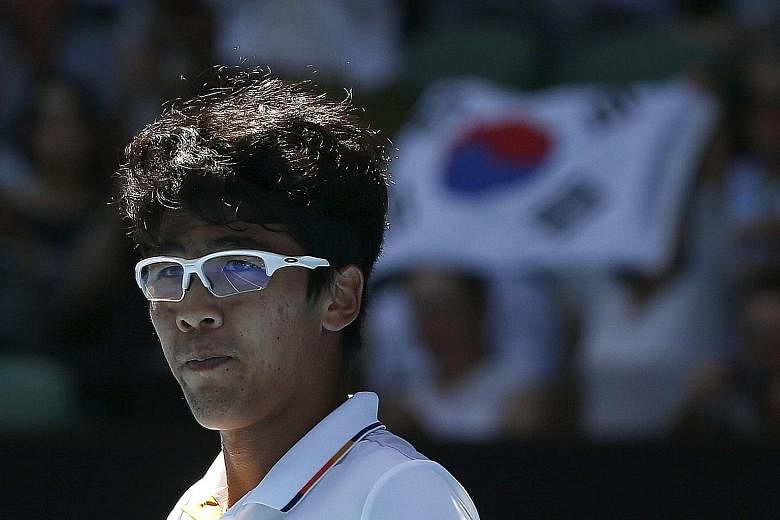MELBOURNE • He had pretended to be his idol Novak Djokovic as a child, modelling his game on the 12-time Grand Slam champion's as he played matches against his older brother in a parking lot in front of the family's home and elsewhere.
All that "practice" being Djokovic paid off last Monday, when the 21-year-old Korean displayed almost superhuman court coverage to prevail against the ailing Serb in the fourth round of the Australian Open.
Chung continued moving through the draw, becoming the first player - man or woman - from South Korea to reach the semi-finals of a Grand Slam, where he eventually fell to Roger Federer.
Lee Hyung Taik was the last of the two Koreans to reach the fourth round of a Grand Slam when he made the last 16 at the US Open way back in 2007.
Tomorrow, Chung will climb to No. 29 from 58th in the rankings; the highest singles ranking ever for any Korean.
Yet, few could have the forecast such a bright future for Chung, who took up tennis at age six for medical reasons. Struggling with poor eyesight, he would blink constantly and an optometrist who diagnosed him with myopia and astigmatism, suggested he take up tennis.
His mother, Yong Mi, explained through a translator: "The doctor said instead of looking at the tiny letters of the book, it's better to look at the green colour.
-
20x
-
Chung Hyeon's Instagram followers has swelled from 6,000 to 120,000 and counting.
"In Korea, all the fences around the tennis courts were green."
While his eyesight remains weak and he still sports spectacles, Chung is now an imposing athlete, standing at 1.88m, one whose acrobatic defence and ability to generate power in extension look very familiar. Chung's style "reminds me obviously a lot of Novak," Federer added. "The way he's able to slide on forehand and backhand and use the hard court as a clay court and get balls back and stay aggressive in defence... We will see much more of him. Top 10 for sure."
Practically unknown in South Korea a fortnight ago, Chung - dubbed "The Professor" because of his trademark thick, white-rimmed glasses - has quickly gained superstar status at home.
His victory over Djokovic was front-page and home-page news. The mass-circulation Chosun Ilbo newspaper said the world had been "caught by surprise".
Chung's run drew top television ratings, and media hailed him as "rewriting" the history of tennis in a country which boasts Asia's fourth-largest economy.
"Wow, I watched a tennis match for the first time because it was the talk of the town but I didn't know it was such a fun sport," said one online comment.
With his success Down Under, Chung is already driving sales of tennis products in South Korea. The country's leading online auction and shopping mall website Gmarket has seen a boom in tennis products including shoes, bags, rackets and balls.
Earlier last week, sales of every tennis-related product rose 24 per cent from the previous week, with tennis shoes seeing the largest increase of 129 per cent.
"It is very rare to see an increase in tennis-related products, as it is winter, meaning it is not the tennis season," said Oh Hye Jin, public relations specialist at Gmarket.
"Tennis" became a trending topic in the nation of 51 million people over the past week and the sport could enjoy the flow-on effect of Chung's success for years to come.
South Korea has a precedent for excelling at a sport after a trailblazer led the way. After Pak Se Ri's LPGA Tour victories from 1998 onwards, South Koreans now dominate women's golf. And when figure skating sensation Kim Yuna won gold at the 2010 Vancouver Winter Olympics, it led to a flurry of children lacing up their skates and gliding onto the ice.
Chung's bank account is also set to enjoy a growth spurt. His run to the semi-final has led to "unprecedented interest from potential and existing sponsors," said Stuart Duguid, who represents Chung at WME-IMG and who noted that Chung's Instagram followers exploded from about 6,000 - to more than 120,000.
Besides being a surprise package, Chung has also endeared fans with his humour on the court, working the crowd with a hand-flapping celebration like many a show-boating National Basketball Association player.
After defeating six-time Melbourne Park winner Djokovic, he wrote in Korean on his social media account: "You know this is not the end? Mr Chung will keep moving on!"
He shyly confided last week that he does not have a girlfriend, and that he likes to eat Chinese food before a match - Korean is too heavy apparently.
And in an interview with a South Korean news agency in November, he revealed his favourite activity: "What I like to do most is just rolling on my bed. I can do that for days."
Given his rising star, those days are numbered.
AGENCE FRANCE-PRESSE, NYTIMES, REUTERS, BLOOMBERG, GUARDIAN

